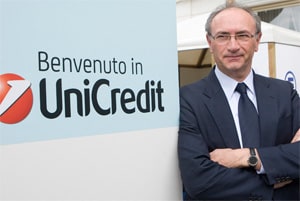NEWSMAKERS: ITALY
By Laurence Neville
While many big wigs in the world of finance hit the World Economic Forum in Davos, Switzerland in late January to rub shoulders with glamorous attendees from business, politics and showbiz—this year led by Rolling Stones frontman Mick Jagger—Federico Ghizzoni, UniCredit’s beleaguered CEO, decided to skip the annual jamboree in favor of rebuilding of his struggling bank.
 |
|
Ghizzoni strengthens capital ratios and builds liquidity access |
In December, UniCredit was told by the European Banking Authority that stress tests showed the bank needed an extra €8 billion in capital by the end of June. This came as no surprise to UniCredit, which is one of the most systemically important banks in Europe, with operations in 22 countries. It had already announced a massive strategic review in mid-November and announced a €7.5 billion rights issue to raise capital.
UniCredit’s problems look like Europe’s banking crisis in microcosm. Despite some impressive assets in Italy, Germany and across CEE, at the beginning of January it had a €38.8 billion exposure to Italian government bonds—and plenty of exposure to other stricken European countries. The Italian exposure alone was equal to almost all of the bank’s equity: In the unlikely event of a default, it would be wiped out.
However, in the nightmarish negative feedback loop that is European banking, the prospect of UniCredit’s having to raise capital by offloading its government bonds—or failing to buy more in forthcoming auctions—was equally bad. The answer was UniCredit’s third cash call in three years, this one to a syndicate of 27 banks to ensure the entire market bought into the concept of the deal, and some high-profile political support from Italian prime minister Mario Monti.
Despite a shaky start that must have given Ghizzoni some sleepless nights—shares fell 45% in the four trading days after terms were released—he has been vindicated by the result. Investors took up 99.8% of shares available, and the stock has soared. Moreover, UniCredit has been quick to build on its success with a €3 billion buyback of bonds to further strengthen its capital and plans for €25 billion of covered bond issuance to broaden its access to funding.



